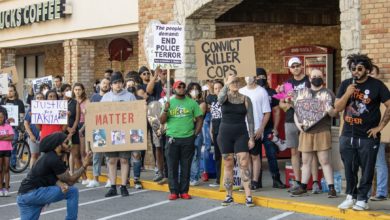Police officer Andrew Delke still has not been tried for the murder of Daniel Hambrick. It has been more than two and a half years since Delke shot Hambrick during a foot chase in Nashville, Tennessee.
Delke, a white police officer who was 25 at the time of the shooting, has been charged with first-degree murder for shooting Daniel Hambrick, a 25-year old Black Nashvillian, in the back during a foot chase following a traffic stop in North Nashville on July 26, 2018. Delke, was caught on camera running after Hambrick, who was armed, for blocks. At no point was Hambrick seen reaching for a gun; he instead appeared to be running for his life.
As made clear by the video footage, when Delke was unable to catch his victim on foot, he stopped running, assumed a firing position, and shot Hambrick three times, including once in the back of the head. Delke then failed to administer any first aid to Hambrick. In fact, Delke walked away from Hambrick. None of the cops who later arrived attempted to help Hambrick before the ambulance arrived. He was likely dead by then.
Andrew Delke was first placed on administrative leave following the incident, and he was decommissioned on September 28, 2018. Yet, he remains a paid employee of the Metro Nashville Police Department. According to a complaint filed by the Hambrick family for a $30 million civil rights federal lawsuit against MNPD and Andrew Delke, from March 4, 2017 to July 26, 2018,
“the ratio of Black to white drivers that Officer Delke subjected to traffic stops was consistently above the average of other MNPD officers patrolling in the same geographic zones. … Over that same period, Officer Delke subjected black drivers to roadside searches at a rate 2.8 times higher than the median search rate for other MNPD officers working patrol in the same geographic zones.”
Racial bias is not a problem that is unique to Andrew Delke; the MNPD has been noted for its racist practices, such as stopping Black drivers at a disproportionate rate, for decades. Until 2017, the MNPD used a decades-old recruitment book that had racist policing policies within it.
Andrew Delke is the first MNPD officer to be charged with murder for killing someone in the line of duty. However, his trial is not set to begin until July 2021. Delke’s high-powered attorneys first delayed the trial in 2019 by filing a motion to have a jury from outside of Davidson County, of which Nashville is a part, to be brought in to hear the case. This motion was denied by Judge Monte Watkins. Then in 2020, the trial was again delayed due to COVID-19.
Delke’s defense attorneys’ latest antics involved filing for a motion in January to have their client’s trial moved outside of Davidson County. They argued that it would be impossible to find a fair, unbiased jury in the county because of the media coverage surrounding the shooting and the case. Moreover, they claimed that Nashville residents have a bias against police, pointing to the summer protests which took place in downtown Nashville in solidarity with the national rebellion demanding justice for George Floyd, Breonna Taylor, Elijah McClain, and other victims of police brutality. Judge Watkins denied this motion after he determined that exposure to publicity surrounding the trial does not prevent a prospective juror from being fair and impartial.
It is not terribly shocking that a cop would be allowed to move freely and remain employed after killing someone, given that police officers in the country are generally insulated from having to take full responsibility for their criminal actions. Cops who kill alleged suspects of crime under questionable circumstances are sometimes disciplined or fired, in response to public pressure. However, they are rarely charged with murder and convicted.
In the United States, there is often an intense campaign by the corporate press to paint victims of police brutality as aggressors, “thugs,” as dangerous elements to society. The implication of such scrutiny is that the victim’s background, history, previous actions, somehow warranted the violence committed against them by the police. In the absence of mass public outrage and a movement in the streets, these calculated campaigns shape public opinion in favor of the police. Jurors picked to hear cases against cops are often reluctant to question the officers’ decisions.
The police have expert defense attorneys and police unions at their disposal to protect them. The U.S. criminal justice system — the courts and the police — is a part of the repression wing of the capitalist government. It exists to act as a buffer between the working class and the ruling class. The criminal justice system is not designed to charge those from within its own repressive apparatus.
A killer cop in Nashville continues to work and move about freely for years after shooting someone three times in the back. The luxuries and delays afforded to Andrew Delke for his unjustifiable murder of Daniel Hambrick are absurd. Meanwhile, the Hambrick family is having to wait until July 12, 2021, almost three years after the tragic event, to have the public servant who killed their relative face trial; justice remains unserved.
Feature image: Liberation collage. Left: Daniel Hambrick (Legacy.com) Right: Protest in August of 2018, (screenshot from Channel 5)






